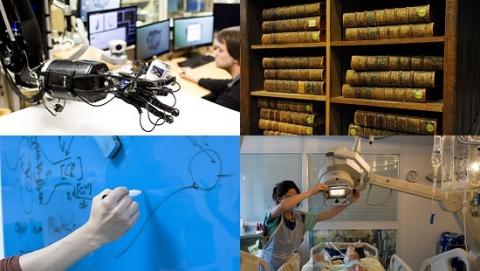
Institutes and Initiatives Lead the Way for Transversal Doctoral Programs
Since 2015, Sorbonne University has developed 9 Institutes and 11 Initiatives. Élisabeth Angel-Perez, Vice-President of Research and Innovation, and Bertrand Granado, Director of the Doctoral College, present these programs and encourage researchers to propose projects for the current recruitment campaign.
What are the doctoral programs run by the Institutes and Initiatives?
Élisabeth Angel-Perez : The primary objective of the Institutes and Initiatives is to promote multidisciplinary or interdisciplinary collaboration between scientific communities. The institutes bring together communities affiliated with several partners of the Sorbonne University Alliance. Initiatives are often inter-faculty, and when they are intra-faculty, they create synergies between teams from different doctoral schools. It is necessary that all researchers become aware of the importance of working across disciplines, with a transversal approach. This driving principle of new research, which is not located only at the heart of disciplines but at the interface, bringing out new ways of approaching the research object by confronting methods with other practices. There aren’t many researchers who cannot enter into a dialogue with one of these initiatives or institutes.
Bertrand Granado : The Institutes and Initiatives programs do not have a monopoly on working transversally. For example, the Interface for Life programs (IPV) was created to continue to fuel transdisciplinary research between biology, computer science, mathematics and also the humanities and social sciences (SHS). Other programs, such as Digital Methods in Humanities and Social Sciences, are carried out by service units such as CERES. All these programs are driven by the same desire to get researchers to work together.
What is the added value of research that has an interdisciplinary approach?
B. G. : Society is changing rapidly. The subjects of study are becoming more complex and can no longer be studied solely in a doctoral school because they have implications elsewhere. We have to work with other aspects, especially in the social sciences. Transdisciplinary approaches allow us to not just consider an object from a disciplinary point of view, but rather its different facets and to study it from different angles. The disciplines have their own vocabulary and methods. The same word does not mean the same thing from one discipline to another. This is what we have to share in order to understand each other and learn to talk to each other.
É. A-P. : Interdisciplinary research makes it possible to ask questions in a different way and to open up new perspectives by bringing out new subjects. It has the power to innovate and to think better and more widely.
In concrete terms, who can submit a project to the Institutes and Initiatives programs?
É. A-P. : Before answering your question, let us specify that the Institutes and Initiatives do not replace research teams or units. They bring together researchers who are each responsible for their own research unit. They are virtual components that are not structured in the same way as research teams.
B. G. : Any holder entitled to direct research who is part of a laboratory at a doctoral school of the Alliance may submit a project to one of the Institutes or Initiatives. Doctoral projects submitted to the Institutes and Initiatives programs are validated by the doctoral schools, which remain the place where doctoral degrees are managed.
É. A-P. : In the Institutes and Initiatives, co-directorships and co-management are preferred. While the principal applicant must be attached to the Sorbonne University Alliance, this is not necessarily the case for the co-director. This makes it possible to intensify relations with regional, national or international partners.
How are the doctoral projects of the Institutes and Initiatives programs funded?
É. A-P. : Doctoral contracts for Institutes and Initiatives are not taken from the quota of doctoral schools. They are financed by the Idex, which is not intended to support long-term programs. 57 doctoral contracts have been offered in 2021. This is a fundamental contribution for doctoral schools and teams, particularly in the Humanities and Social Sciences, where the percentage of unfunded theses is high. The Institutes and Initiatives are endowed with two or four doctoral contracts per year over four years.
Who can enroll in these programs?
B. G. : Any candidate who has or is in the process of obtaining a Master’s degree.
Dates to remember
Submission and validation of projects:
- 14 January: Campaign launch
- 21 February: End of online submission of projects by applicants entitled to direct research
- 4 March: Return of the doctoral schools to the Doctoral College
- 11 March: Communication of all projects pre-selected by the Doctoral College to the institutes and initiatives
Applications for Master 2 level
- 18 March: Projects are put online
- 26 April: End of the application process for candidates
- Beginning of May: Applications sent to the Institutes and Initiatives
- 16 May and 27 May: Hearing of candidates by the juries of the Institutes and Initiatives
- 3 June: Announcement of the winners
